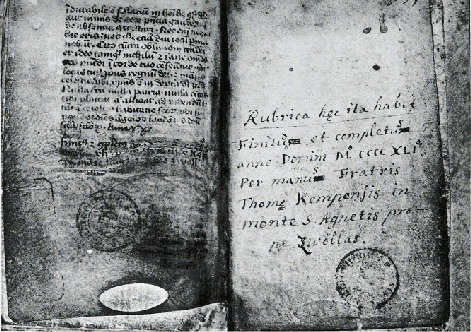Manuscript of Thomas à Kempis’ Imitation of Christ [public domain / Wikimedia Commons]
***
Catholic bloggers on Patheos (we call ourselves “Patheosi”) are having a good discussion about this issue right now in our private forum.
It started with someone noting the article, “The Problem with ‘A Personal Relationship with Jesus'” (Dr. Jay Boyd, Homiletic & Pastoral Review, July 10, 2014). The Catholic author took a negative view of the phrase; also taking issue with Patheos blogger Sherry Weddell’s 2012 book, Forming Intentional Disciples: The Path to Knowing and Following Jesus (OSV).
I recalled an old article of mine on this topic that I had (ironically) deleted in preparing to migrate here, because it had too many quotes. I quickly resurrected it on Internet Archive and will bring back some of it in this post.
I think that any term can be abused or limited, or given a lot of baggage, as some Protestants do, but the notion itself is not essentially foreign to Catholicism. It’s good to find common ground with Protestants (per Vatican II and St. Paul’s “I have become all things to all men”) and in my opinion, it’s not a worthwhile fight, to sound as if we neglect this aspect, by warring against a phrase. When I edited a book about the Catholic Mystics, I observed far more truly “personal” and deeper relationship with Jesus than I ever saw in evangelical ranks. Similarly, I defended the hymn Amazing Grace against criticism from “muckraking” Catholic broadcaster and You Tube phenom Michael Voris, who claimed it was “anti-Catholic.”
Fr. John Riccardo (a wonderful priest in metro Detroit who has a radio show) once recounted a story where a devout Protestant asked him if he had a personal relationship with Jesus. He replied that he received Jesus’ flesh and blood into his body every day (the Eucharist) and stated, “I don’t know how much more personal it can get than that.”
Catholics have this same relationship in their own way, couched in different terms, and Catholicism teaches its adherents to renew their commitment to God not just once in an “altar call” but daily (hence the daily Mass).
As but one example of many that could be produced, The Imitation of Christ is a spiritual classic, written by was written by Thomas à Kempis (c. 1380 – 1471), sometime between 1418 and 1427. I read it (probably an edited version) as a Protestant many years ago, and ever since have regarded it as the work closest in spirit and nature to the Bible of any book I’ve ever read. This book is typical of many dozens of such meditations by pious Catholics and Catholic mystics through the ages. Here are just a few portions that would relate to the question of a “personal relationship with Jesus,” as many Protestants would put it. This communion with God is not at all foreign to authentic Catholic practice and tradition and devotion:
Christ will come to you offering His consolation, if you prepare a fit dwelling for Him in your heart, whose beauty and glory, wherein He takes delight, are all from within. His visits with the inward man are frequent, His communion sweet and full of consolation, His peace great, and His intimacy wonderful indeed.
Love Him, then; keep Him as a friend. He will not leave you as others do, or let you suffer lasting death. Sometime, whether you will or not, you will have to part with everything. Cling, therefore, to Jesus in life and death; trust yourself to the glory of Him who alone can help you when all others fail.
Your Beloved is such that He will not accept what belongs to another—He wants your heart for Himself alone, to be enthroned therein as King in His own right. If you but knew how to free yourself entirely from all creatures, Jesus would gladly dwell within you.
It is a great art to know how to converse with Jesus, and great wisdom to know how to keep Him. Be humble and peaceful, and Jesus will be with you. Be devout and calm, and He will remain with you. You may quickly drive Him away and lose His grace, if you turn back to the outside world. And, if you drive Him away and lose Him, to whom will you go and whom will you then seek as a friend? You cannot live well without a friend, and if Jesus be not your friend above all else, you will be very sad and desolate.
I can see both sides of the question, though. As an analogy to the view I am not taking presently, I never call myself a “Roman Catholic”: not because it is intrinsically incorrect (rightly understood) but because of the baggage of the original Anglican anti-Catholic use of it, in a futile effort to pretend that they were “Catholics” also: just not those wicked “Roman [papist] Catholics.” As one familiar with that history, I don’t use it because I don’t wish to be a pawn in that word game. “Catholic” is perfectly adequate on its own.
But there is a legitimate use of “Roman Catholic,” too, and even one as great and eminent as John Henry Cardinal Newman (my own hero) used it. I’m not sure why (because he knew the Anglican anti-Catholic history very well), but he did; so I don’t get too legalistic against its use. If it is used, I think it must be explained, to overcome false conceptions of the Catholic Church.
It also implies an exclusion of Eastern Catholics, which is unfair and uncalled-for. The Catechism never, to my knowledge, uses it.
This question is similar. The phrase in dispute clearly comes from a Protestant milieu, so the issue is whether we ought to use it. I say we should, provided we always make clear what we mean and don’t mean by it. I believe that the good achieved by common ground in this regard is more important than possible misunderstandings: which we can clear up by clarification, anyway. Thus we can have the “best of both worlds.”
In any event, “personal relationship with Jesus” is always profoundly sacramental for us (beyond the indwelling which all Christians believe in) in a way that is not true of most Protestants. This is the heart (no pun intended) of the Catholic conception of it.


















